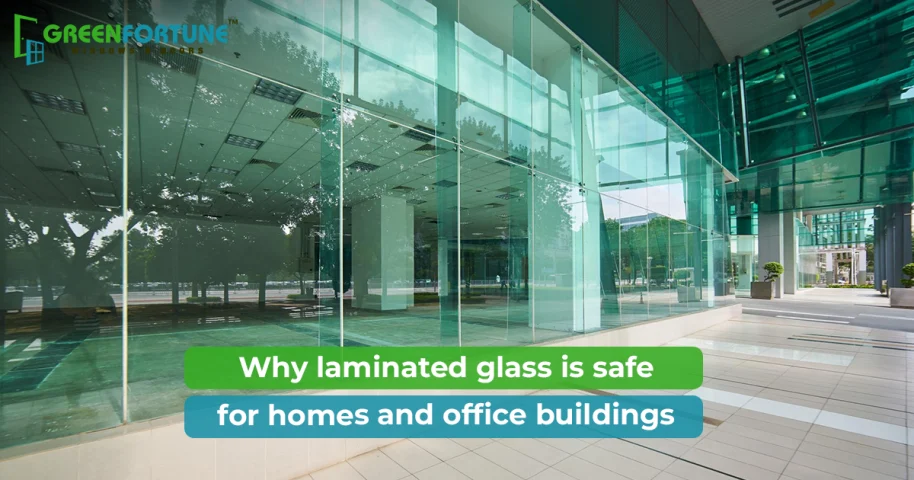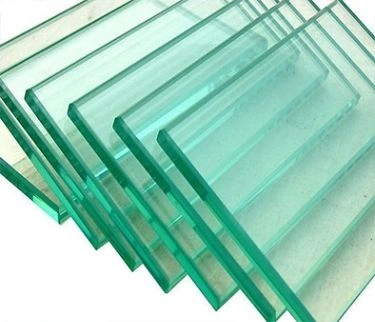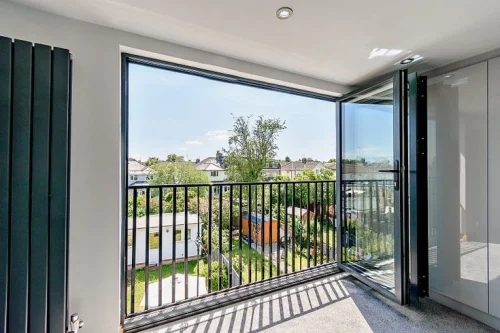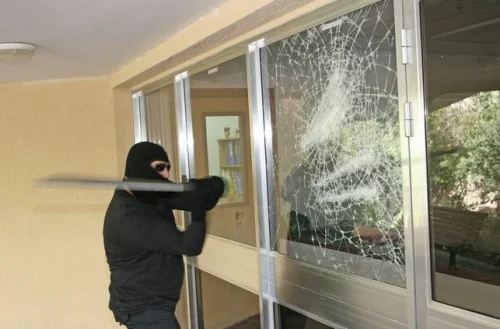
Benefits of Installing Intrusion Alarm System Doors in 2025
July 22, 2025
Top Japandi Design Style Features For Indian Homes
July 23, 2025When the vast majority of us think about home or office security, we probably think about locks, cameras, alarms, or perhaps a large gate surrounding our property. But what about the windows? They’re one of the most vulnerable aspects of a home in terms of break-ins, and they are often disregarded.
That’s where laminated security glass is useful.
And this is not your average glass with a fancy name. With your safety and well-being in mind, from you and your loved ones to your property and peace of mind. Whether you are living in a snug apartment or running a company out of a high-rise office, glass like this can really make a difference.
Let’s break it down.
Table of contents
- What is Laminated Security Glass?
- How Laminated Security Glass Makes a Real Difference
- Where Can You Use Laminated Glass?
- How Does It Compare with Other Glass Types?
- Common Myths (And the Truth)
- How to Choose the Right Laminated Glass
- Easy to Maintain, Built to Last
- Final Takeaway
- Thinking About an Upgrade?
- FAQs
What is Laminated Security Glass?
So you’ve heard the expression. But what is laminated security glass?
It is manufactured by sandwiching a special plastic layer — a substance called PVB, or polyvinyl butyral — between two pieces of glass. All of these layers are laminated and glued together under high heat and pressure. The result? One thick pane that doesn’t shatter like regular glass.
If broken, the glass sticks together, rather than shattering into sharp shards. It breaks, but not into pieces. That is why “safety glass for windows” is named that way — because it is designed to protect people even in the absolute worst case.
It's not just about safety after impact—it’s about smart protection all around. That’s why more modern homes and large commercial buildings are now making the shift to laminated glass. From high-rise offices to ground-floor apartments, people are choosing it as a reliable first line of defense against both accidents and intrusions.
You’ve probably seen it already without knowing. It’s used in car windshields, banks, airports, and now it’s becoming more common in homes and offices too.
How Laminated Security Glass Makes a Real Difference
There are tons of reasons why laminated glass is gaining popularity. Let’s look at the big ones.
1. Tough Against Break-Ins
Imagine a burglar with a crowbar trying to get in through your window. Regular glass will shatter in seconds. But laminated security glass? It takes hit after hit and still holds together.
This gives you time. Time to call for help. Time for an alarm to go off. Time that could make all the difference.
It’s not called burglar-proof glass, but it makes life harder for intruders.
2. Broken Glass Stays in Place
One of the biggest dangers with glass isn’t just the break—it’s the sharp pieces that fly around after it breaks. Those shards can cause serious injury.
But with laminated glass, the broken pieces stay stuck to the inner layer. No sharp edges flying through your living room or office. It’s safe for kids, pets, and anyone nearby.
3. Blocks Outside Noise
If you live in a noisy neighborhood or your office is near traffic, you’ll love this. Laminated security glass has soundproofing qualities. That plastic layer in the middle? It actually helps block out sound.
It’s not completely silent, but it reduces a lot of the outside noise—whether it’s honking horns, barking dogs, or loud neighbors. You get a quieter space to work, sleep, or just relax.
4. Protects Against Harmful UV Rays
Sunlight is great, but UV rays aren’t. They fade your furniture, damage artwork, and can even be harmful to your skin over time.
Laminated glass blocks up to 99% of UV rays. That means your home or office interiors last longer and stay looking fresh. It’s like sunscreen for your windows.
5. Saves Energy and Lowers Bills
Here’s something many people don’t realize: laminated security glass also helps with insulation. It keeps heat out during summer and traps warmth in during winter.
Result? Your AC or heater doesn’t have to work as hard. Lower energy use = lower bills. Over time, that adds up.
Where Can You Use Laminated Glass?
It’s super versatile and works well in both homes and offices. Here’s how.
In Homes:
- Big sliding doors
- Balcony and terrace doors
- Bedroom windows near the street
- Kitchen or bathroom windows that need privacy and safety
If you live in a villa or on the ground floor, laminated security glass is especially useful. It protects against both intruders and storms.
In Offices:
- Glass partitions
- Entry doors
- Reception areas
- Conference rooms
It adds a layer of protection without ruining the modern, glassy office look. Your equipment, client data, and staff are safer.
How Does It Compare with Other Glass Types?
Here’s a simple chart to help you see the difference:
Feature | Laminated Glass | Tempered Glass | Wired Glass |
Break resistance | Excellent | Better | Okayish |
Shatter-proof | Excellent | No | Normal |
Noise control | Better | No | No |
UV protection | Better | Okayish | No |
Energy saving | Better | No | No |
Safety after breakage | Excellent | No | Somewhat |
So, among all the types of security glass, laminated glass clearly offers the most balanced protection.
Common Myths (And the Truth)
Let’s bust a few myths real quick:
- It’s only for rich people or banks.
Nope. Laminated security glass is being used in regular homes and small offices now. It’s becoming more affordable than ever. - It looks bulky or weird.
Not at all. It looks just like any other clear window. You won’t even notice a difference—until it matters. - It’s too expensive.
It may cost more upfront than regular glass, but think long-term: lower energy bills, fewer repairs, better safety. It's a smart investment.
How to Choose the Right Laminated Glass
There are different thicknesses available—6.38mm, 8.38mm, and even up to 12.38mm for extra protection. Your choice depends on where you're using it and what level of security you need.
Things to consider:
- How noisy is your area?
- Do you get direct sunlight?
- What’s your budget?
- Are you near a busy road or in a high-rise building?
Also, make sure your frames can support laminated glass. Most modern window frames can, but it’s good to check.
Easy to Maintain, Built to Last
You don’t need any special tools or products. Clean it like you clean regular glass—just use a soft cloth and glass cleaner.
It doesn’t scratch easily, doesn’t peel, and holds up well in any weather. Unless someone is swinging a hammer at it, you’ll probably never need to replace it.
Final Takeaway
Here’s the simple truth: laminated security glass is one of the smartest upgrades you can make, whether you're a homeowner or a business owner.
It protects you from intruders, flying glass, UV rays, and even noise. It keeps your space quieter, cooler, safer, and more private. And while it might cost a little more than regular glass, it gives back so much more in return.
Thinking About an Upgrade?
Say goodbye to noisy streets and weather-worn wooden frames. Our uPVC windows and doors are designed to block out sound, resist heat and rain, and keep your space looking elegant. Explore our collection today and give your home the upgrade it deserves.
FAQs
- Can laminated security glass be installed in existing window frames?
Yes, in most cases, laminated security glass can be fitted into existing window or door frames. However, it’s important to check if the current frame can support the extra weight and thickness. A professional installer can assess compatibility and ensure safe fitting.
- Is laminated security glass suitable for areas with extreme weather?
Absolutely. Laminated security glass performs well in harsh weather, including heavy rains, strong winds, and hail. It doesn't crack or shatter easily, making it ideal for both coastal regions and storm-prone areas.
- Does laminated security glass help with indoor privacy?
Yes, it can improve privacy depending on the finish or tint you choose. Many homeowners opt for frosted or tinted laminated glass in bathrooms, meeting rooms, or street-facing windows. It blocks visibility while still letting in natural light.










